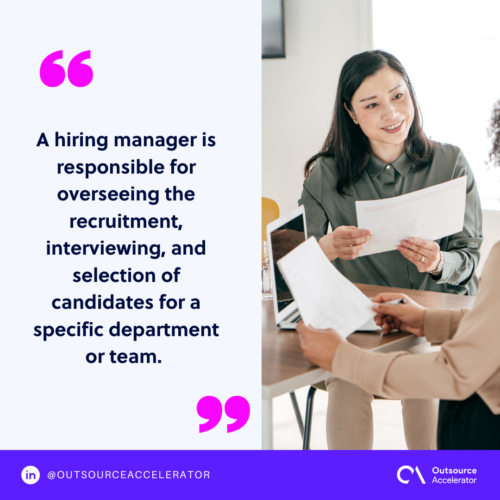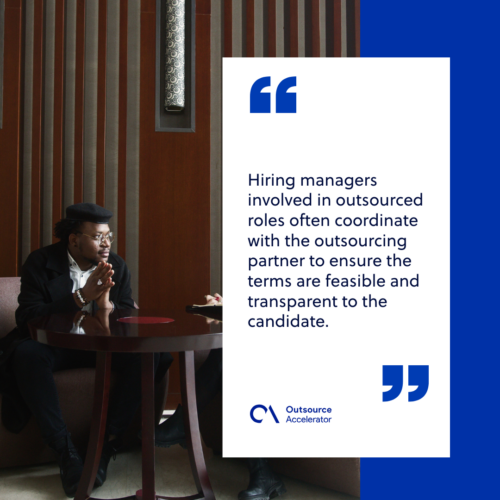The role of a hiring manager: Key responsibilities and best practices

Hiring managers play a critical role in shaping an organization’s workforce.
In companies that partner with outsourcing firms, the hiring manager’s responsibilities often become even more dynamic. They require collaboration not just within the company but with external providers as well.
This collaboration ensures the company attracts the right talent, from outsourced roles to internal positions, with a smooth, effective hiring process.
It’s a magical moment when hiring managers align closely with both in-house goals and the expertise of outsourcing partners. They can fill roles faster, onboard more efficiently, and bring valuable expertise to the company’s growth strategy.
In this article, we’ll examine the role of a hiring manager and how they can help make the process smoother.
What is a hiring manager?
A hiring manager is responsible for overseeing the recruitment, interviewing, and selection of candidates for a specific department or team.
In most companies, the HR department usually handles the initial stages of recruitment. The hiring manager fits in here by bringing departmental knowledge and specific requirements.

Their insight ensures that selected candidates not only fit the role technically but also align with the team’s culture and objectives.
In companies that partner with outsourcing firms, hiring managers coordinate between internal departments and the outsourcing provider.
By working with an outsourcing partner, hiring managers can leverage additional recruitment resources, access a larger talent pool, and expedite the hiring process for specialized roles.
5 Key responsibilities of a hiring manager
The hiring manager typically handles these responsibilities:
1. Collaborating with HR and senior management
A hiring manager’s first responsibility is to understand the hiring needs of their team or department. This often involves close collaboration with HR and senior management to define the skill sets required, establish timelines, and agree on budget allocations for new hires.
This clearly outlines expectations for both in-house roles and outsourced positions, making the hiring process smoother and more strategic.
In cases where outsourcing is involved, the hiring manager must also ensure that outsourcing partners fully understand the requirements of each role.
2. Crafting effective job descriptions
The right job description is needed to attract the right candidates. Hiring managers work with HR to craft detailed descriptions that outline job responsibilities, required skills, and qualifications.
For roles that may be outsourced, it’s essential to convey the scope and requirements clearly. Outsourced candidates often need additional information to understand the specific tasks, cultural aspects, and reporting structures of the organization they’ll support.
The clearer the job description, the easier it is for both internal HR and outsourcing providers to attract candidates who fit the role and the company’s broader objectives.
3. Screening and shortlisting candidates
Once applications start pouring in, the hiring manager is responsible for screening resumes and identifying potential candidates for the next phase of the hiring process. This involves assessing resumes to gauge technical skills and job experience.
For companies working with outsourcing firms, this process might also include reviewing high-potential candidates pre-vetted by the outsourcing partner.
Hiring managers may also hold initial interviews with shortlisted candidates to assess compatibility, communication skills, and fit with the company culture.
4. Leading the interview process
Hiring managers lead the interview process by coordinating with HR and other relevant stakeholders. They prepare interview questions tailored to the specific role and arrange for any necessary skills assessments.
A structured interview process can objectively evaluate each candidate’s qualifications, helping ensure a fair and consistent approach to hiring decisions.
This step is particularly important when working with outsourced roles, as it can measure how well the candidate might adapt to remote collaboration and outsourced work dynamics.
5. Decision-making and extending offers
The hiring manager’s final responsibility is to make a hiring decision and extend an offer. In collaboration with HR, they discuss compensation, benefits, and terms, then present these to the chosen candidate.
Hiring managers involved in outsourced roles often coordinate with the outsourcing partner to ensure the terms are feasible and transparent to the candidate.
This fosters a smooth onboarding process and sets the stage for a productive working relationship.

Best practices for hiring managers
Consider these best practices for the hiring managers you source:
1. Define clear hiring goals and requirements
Defining clear, achievable hiring goals is crucial for hiring managers. When companies work with outsourcing providers, this clarity becomes even more important.
Setting clear goals assists in accurately assessing a candidate’s performance once hired, providing a benchmark to measure against.
2. Build a structured interview process
A structured interview process allows hiring managers to assess candidates consistently, reducing bias and making the hiring process more efficient.
This structure is especially valuable for companies partnering with outsourcing firms. It enables a uniform assessment of both in-house and outsourced candidates, ensuring an equal standard for quality and fit.
Hiring managers can create a list of standardized questions that focus on essential competencies, technical skills, and situational judgment. These help in making fair comparisons among candidates.
3. Engage in proactive candidate outreach
To attract top talent, hiring managers should engage in proactive outreach through professional networks, social media, and partnerships with outsourcing companies.
This outreach builds a pipeline of qualified candidates and strengthens the company’s employer brand, attracting individuals who are genuinely interested in the company’s mission and values.
4. Enhance the candidate experience
Candidate experience has become a critical part of successful hiring. Positive candidate experiences can make a lasting impression and contribute to a favorable employer brand.
Hiring managers can create a positive experience by communicating transparently, providing timely feedback, and ensuring that interviews are respectful of candidates’ time.
When working with outsourcing partners, candidate experience impacts not only the company’s reputation but also the likelihood of attracting high-quality talent in the future.







 Independent
Independent




